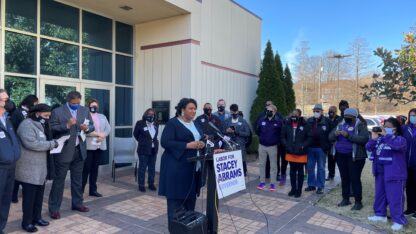Prosecutors, Defense Attorneys Took Issue With Ga. Ballot Question — Here’s What Changed

A photo of Marsy Nicholas sits against a chair during a 2013 rally in California. “Marsy’s Law” is named after Nicholas, a college student who was stalked and killed in 1983 by an ex-boyfriend. If the Marsy’s Law amendment passes in Georgia, crime victims’ protections would essentially become elevated to the state constitutional level.
Bret Hartman / AP Images for Marsy'sLawForAll.org
Aside from a slew of open seats up for vote on Election Day, Georgia voters will find seven statewide questions on the ballot.
Five of those involve changes to the state’s constitution, including an amendment that would add specific rights and protections for crime victims.
If a majority of voters support Amendment 4, often referred to as “Marsy’s Law,” Georgia’s existing crime victims’ protections would essentially become elevated to the constitutional level. That means future changes also would have to go on a statewide ballot, in practice, making the protections better able to withstand future political pressures.
Marsy’s Law, a well-funded national campaign on six states’ ballots this year, has its share of opponents. Montana’s Supreme Court even struck down the measure after voters passed it.
In Georgia, both prosecutors and advocates for those charged with crimes took a skeptical view of the proposal initially.
Now, both are largely on board.
To hear more about what changed, and why their opposition waned, take a listen to this report that originally aired on Monday’s edition of “All Things Considered.”








